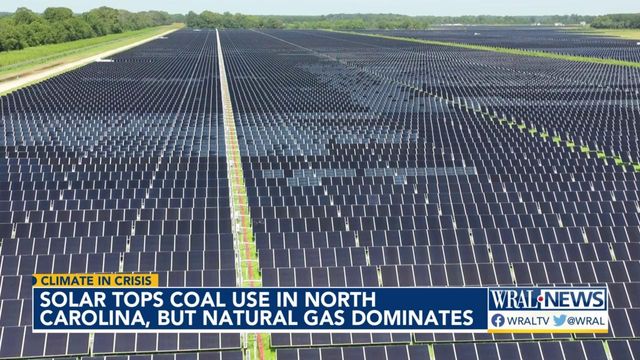Solar outpacing coal in NC, but state is still fossil fuel-dependent
Solar is set to outpace coal consistently in North Carolina, an indication that the state's grid is getting greener.
Cheers and claps rang out at Oak Trail this week, after Leeward Renewable Energy executives cut the ribbon on a 100-megawatt solar project that stretches over 1,200 acres in Currituck County.
"Oak trail solar isn't just an array of solar panels, it’s a symbol of progress," said Jason Allen, CEO at Leeward Renewable Energy.
Solar growth in the state has been booming, in part, due to a steep drop in solar panel prices.
At the same time, Duke Energy spokesperson Randy Wheeless says the utility has been aggressively phasing out coal plants,
"Here in North Carolina Duke's closed probably more than 35 coal units over the last decade and a half," Wheeless said.
Wheeless says Duke Energy also plans to double solar generation over the next 10 years.
However, retired coal assets aren't being directly replaced with renewables.
North Carolina's use of natural gas has nearly quadrupled in the past decade, according to date from the Energy Information Administration.

"When you're closing coal-fired plants, you're closing 24-hour resources, and you almost need to replace it with a 24-hour resource," Wheeless said.
Duke energy filed its updated Carbon Plan Thursday, maintaining its commitment to retire all coal plants by 2035, while adding more than 3.5 gigawatts of natural gas-powered plants on top of the already authorized 2 gigawatts in the previous carbon plan order.
Clean energy advocates, including Matt Abele with the North Carolina Sustainable Energy Association, criticize the utility’s reliance on fossil fuels.
"We’re seeing the utility double down on their investments in natural gas facilities that’s really problematic when we look at trying to reach our goals," Abele said.
State targets mandate lowering carbon emissions in the power sector by 70% by 2030.
While natural gas burns much cleaner than coal, the fossil fuel still releases greenhouse gases, including methane, that contribute to climate change.
Renewables could save ratepayers money too, with solar recently taking the crown as the cheapest source of electricity, according to the International Energy Agency.
Cost may be more important to consumers than ever, as Duke Energy proposes rate hikes that could raise electricity bills by more than 25%.
“A lot of that is attributed to the volatility in natural gas pricing and huge upfront cost of building new natural gas facility," Abele said.
Duke energy says it’s hoping to develop other clean technologies including nuclear and hydrogen, but aims to use natural gas as a cleaner alternative to coal in the meantime.
The updated carbon plan proposal also includes beefing up renewables, including adding nearly 9,000 megawatts of solar and battery storage by 2031.











